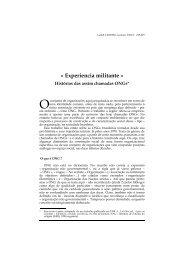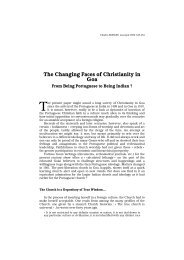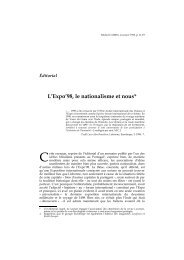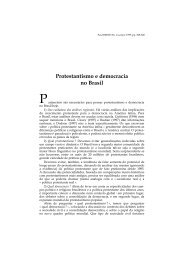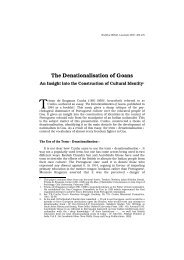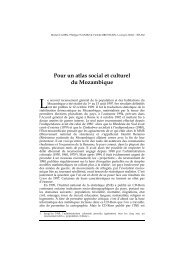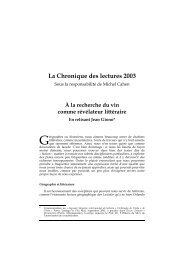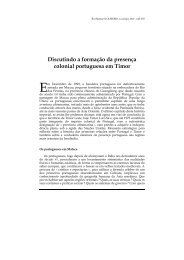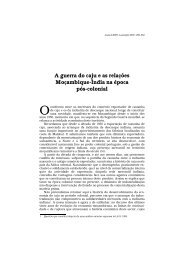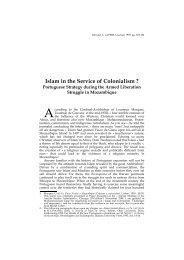some contrasting visions of luso-tropicalism in india - Lusotopie
some contrasting visions of luso-tropicalism in india - Lusotopie
some contrasting visions of luso-tropicalism in india - Lusotopie
You also want an ePaper? Increase the reach of your titles
YUMPU automatically turns print PDFs into web optimized ePapers that Google loves.
SOME CONTRASTING VISIONS OF LUSO-TROPICALISM IN INDIA 381false image <strong>of</strong> Goan culture. He then cites a former American ambassador<strong>in</strong> India, Mr. John Dean Gunther, for remark<strong>in</strong>g dur<strong>in</strong>g a visit to Goa byway <strong>of</strong> an advice to the locals : « You must give the tourists what you have !Not what he wants » 12 .Obviously Prabhakar Angle is on a war-path aga<strong>in</strong>st « <strong>luso</strong><strong>tropicalism</strong> »and exudes strong prejudices aga<strong>in</strong>st the style <strong>of</strong> liv<strong>in</strong>g and behav<strong>in</strong>g <strong>of</strong> theGoan Christians. Such an attitude takes him to easy generalisations, and toclose his eyes to obvious realities, even though they may affect only am<strong>in</strong>ority <strong>of</strong> the Goan population, namely about 35 % Goans who pr<strong>of</strong>essChristianity and had closer cultural-religious contact with the Portuguese.I wish to classify this type <strong>of</strong> writ<strong>in</strong>gs as « Priolkar-Angle literature ».A.K. Priolkar was a Bombay-based Goan Saraswat Brahm<strong>in</strong> who producedliterary output as l<strong>in</strong>guist and historian <strong>in</strong> the 1960s. His research served tobuttress pro-Marathi and pro-H<strong>in</strong>du <strong>in</strong>terests. He emphasized the excesses<strong>of</strong> Inquisition and the cultural backwardness <strong>of</strong> Goan Christians and theirConkani « dialect ». He reserved to Marathi the dist<strong>in</strong>ction <strong>of</strong> be<strong>in</strong>g the trueliterary and cultural language <strong>of</strong> Goa 13 .The reactions <strong>of</strong> Priolkar, Angle and several others need to beunderstood as part <strong>of</strong> the cultural resistance aga<strong>in</strong>st the disturb<strong>in</strong>g effect <strong>of</strong>the Portuguese colonial and missionary policies, and as such they are notwithout foundation. But it would be ridiculous to close one’s eyes to thereality and refuse to admit that the Portuguese presence did not leave deeptraces <strong>in</strong> India for good and for bad. It is a different issue altogether toassess this impact as positive or negative from the Goan po<strong>in</strong>t <strong>of</strong> view, andnot necessarily consum<strong>in</strong>g assessments imported from outside. If Goatoday witnesses a heavy <strong>in</strong>flux <strong>of</strong> people from elsewhere with the <strong>in</strong>tention<strong>of</strong> settl<strong>in</strong>g down there, it is generally because they look on Goans aspleasantly westernised and with a style <strong>of</strong> liv<strong>in</strong>g that dist<strong>in</strong>guishes themfrom other people <strong>of</strong> the country. They are referr<strong>in</strong>g certa<strong>in</strong>ly to traitsacquired by the Goans through colonial contact, through practices <strong>of</strong> WestdirectedChristianity, and through emigration on a big scale. All thesefactors have had their cultural impact upon the Goan society, <strong>in</strong>clud<strong>in</strong>g theH<strong>in</strong>du society. Almost all the visitors to Goa unfail<strong>in</strong>gly register thedifference they feel when they are <strong>in</strong> Goa and when they cross the borders.Goa is seen as a cultural island and <strong>some</strong>what exotic <strong>in</strong> the cultural ocean <strong>of</strong>the surround<strong>in</strong>g subcont<strong>in</strong>ent. I have known many European visitors whoreturn repeatedly to Goa dur<strong>in</strong>g their long sojourns <strong>in</strong> India consider<strong>in</strong>g it agood base for physical and cultural recuperation. All this goes to confirmthat <strong>some</strong> « <strong>luso</strong><strong>tropicalism</strong> » or « Chritianotopia romana » has made itshome <strong>in</strong> Goa and with positive results.I cannot resist record<strong>in</strong>g here an <strong>in</strong>cident that left me baffled <strong>some</strong> yearsago. It was a statement that came from the mouth <strong>of</strong> an orthodox Brahm<strong>in</strong>from Poona, and a known historian <strong>of</strong> the Marathas. Dr V. T. Gune hadbeen Director <strong>of</strong> Goa Historical Archives for nearly twenty years soon afterthe political change. Dur<strong>in</strong>g that phase <strong>of</strong> adm<strong>in</strong>istrative transition Goawitnessed hordes <strong>of</strong> imported adm<strong>in</strong>istrative <strong>of</strong>ficials <strong>of</strong> all grades, because12. P. S. ANGLE, Goa : Concepts & Misconcepts, Bombay, The Goa H<strong>in</strong>du Association, 1994,pp. 19-26.13. A. K. PRIOLKAR, The Goa Inquisition, Bombay, 1961 ; Goa Re-Descovered, Bombay, 1967. ThePortuguese tried to humiliate Concani by brand<strong>in</strong>g it as a language <strong>of</strong> servants, or « línguados criados ».



